Table of contents
Page builders are not made for web designers. They are designed for people who don’t know HTML or CSS and don’t want to deal with the technicalities of the backend.
You know the problem: Your customer has special requirements for his website. After the elaborate project is over, the next customer with completely different needs is standing in front of the door. A page builder alone can rarely be used as an all-round solution.
This article explains why professional web design agencies should not work with page builders.
What is understood by Page Builder?
When we talk about “page builders” here, we are talking about plugins for WordPress that are designed to make it easier for non-professionals to create their website.
Classic examples of this would be small businesses, such as hairdressers or craftsmen, whose core competence is not in the online area. For them, a good website is important, but they often do not have the time or desire to delve deeper into it.
And this is where page builders come into the picture, allowing you to create a beautiful basic website in no time at all using drag and drop.
The most popular page builder plugins are:
Elementor
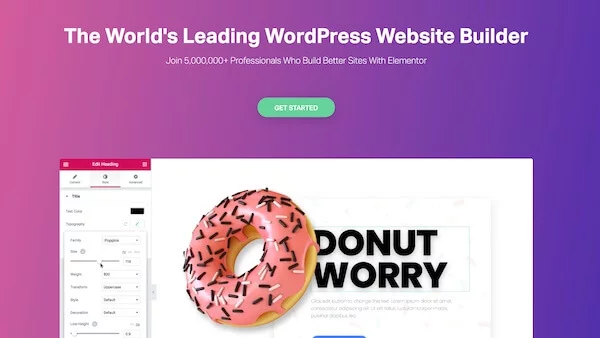
Elementor calls itself “The World’s Leading WordPress Website Builder”. With over 5 million users worldwide, this statement is built on a solid foundation. The tool offers numerous widgets and third-party integrations, which makes it much easier for beginners to build their website. Unfortunately, this leads to increased loading times (more on this shortly), which is not exactly conducive to the user experience.
Visual Composer
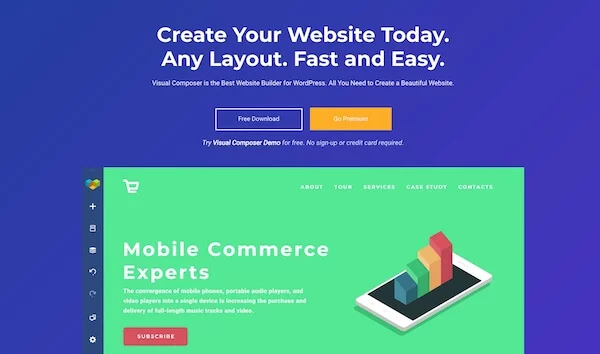
The Visual Composer website builder calls itself “the Best Website Builder for WordPress”. Just like any other layman builder, Visual Composer advertises that no programming knowledge is required to use it.
Especially for agencies, there is a license for $349 per year, which allows you to build 1,000 websites for your clients.
WPBakery Page Builder
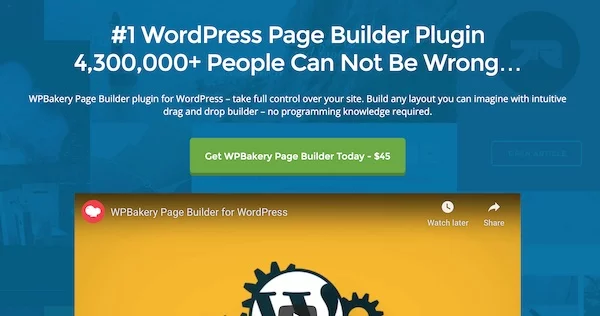
WPBakery Page Builder is the “#1 WordPress Page Builder Plugin” (we’re starting to see a pattern with the titles). Funnily enough, the name of WPBakery Page Builder was originally “Visual Composer”. But after a product launch by the company, a lot went wrong and they had to change the name to WPBakery Page Builder. Page Builder allows you to edit the content of your page. However, it is not suitable for rebuilding entire web pages because you cannot design headers or footers.
Beaver Builder
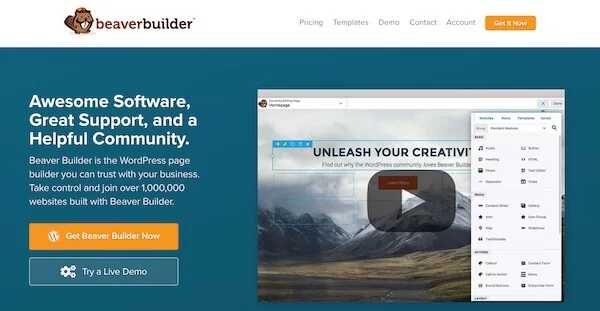
The Beaver Builder is pleasantly restrained with self-congratulation. With over 1 million users, it should not have to hide. For professional web service providers, the Beaver Builder even offers its own theme. On the one hand, this helps with the general integration. On the other hand, you become more dependent on the provider.
Divi
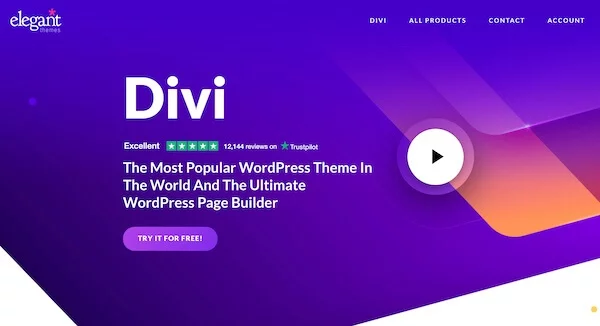
Divi by Elegant Themes is “The Most Popular WordPress Theme In The World” and doesn’t seem to be saving superlatives either. Admittedly, unlike the other alternatives from this list, Divi is a theme and not just a plugin. This offers the advantage of a fundamentally better performance. In addition, Divi even gives you the option to dig deeper into the program code if you want to make changes.
Thrive Architect
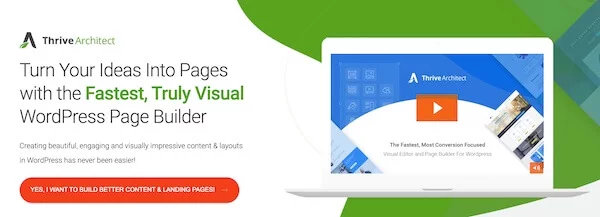
Thrive Architect Page Builder for WordPress is used more in the area of sales and landing pages. Just everywhere where sales are to be generated quickly. Of course, normal pages could also be built with it. However, the included widgets are a bit different compared to the previously mentioned page builders. Thrive Architect also shines with its connectivity to marketing services (such as Mailchimp or HubSpot).
Some of these page builder plugins for WordPress have a free basic version with limited usage options. The paid premium version then contains the complete package of features. The price for a license usually depends on the number of websites you want to use the tool on.
For agencies that create websites for companies, a free basic version is not enough anyway, because the product scope is much too small.
Gutenberg is not a page builder because…
The Gutenberg editor from WordPress also falls theoretically into the category of page builders.
However, it is not quite that simple.
Since Gutenberg, unlike the examples from the list above, is not an external product. The plugins mentioned are developed for WordPress. But WordPress is developed for Gutenberg.
This fundamental difference ensures that you are always one step behind with page builders in the long run.
The disadvantages of page builder plugins for web designers
You have seen the most popular plugins for simple page building. At first glance, they make a good impression, don’t they?
That may be, but you can’t make an omelet without breaking eggs. For the work of a web designer even quite a lot of chips – which leads us directly to the first and biggest disadvantage.
Page builder gives you limited freedom

“So test who commits forever”, we have to think of this saying again and again when designers turn to us because they are not getting anywhere with their Page Builder plugins.
Web service providers who have coded websites themselves know what true freedom feels like. You are not presented with a framework for your creation and only the lack of creativity can hold you back to some extent.
However, completely reprogramming every client’s website is very time-consuming, which is why many themes for WordPress have been developed to make things easier for you.
With WordpPress themes, there are already the first limitations – because some of them do not allow access to the code – but they have undoubtedly made everyday life easier for web designers.
Even web designers who were not born programmers and were never big HTML friends could now create beautiful pages. A good theme bridges the gap between creative freedom in design and technical expertise in program code.
The next step was the page builder plugins, first and foremost Elementor.
Let’s not kid ourselves: A lot of work went into the development of these page builders and although we at GREYD are in competition with them, we don’t want to deny the page builders their success.
The plugins with drag and drop function allow every user to create a first concept of a website in no time. After a short training in the respective tool, you are already able to design your own digital business cards.
You could compare it with kitchen furniture:
Large furniture stores sell prefabricated solutions that fit almost any kitchen. Then there is the possibility of having the furniture made according to your measurements and then assemble it yourself.
However, you have the greatest freedom if you have your individual kitchen made by a carpenter. In this case, you can freely determine every single detail and use materials that the furniture store does not have in its assortment.
Page builders are like the kitchen furniture you build yourself. With a few sacrifices, the website can be quite beautiful.
Unfortunately, it will never be as perfect to your needs as it would be with a web designer (or carpenter).
Page Builder and the poor loading time
The fact that Elementor, Beaver Builder or Visual Composer are not known for legendary pagespeed is nothing new.
Countless site operators have to make roulette-like decisions about which features to include in their websites and which not. With too much bells and whistles, the loading time could suffer (it will definitely suffer). “There is no code faster than no code” …is an old saying for programmers.
And this is where the root of the problem lies. Because page builder plugins load your website with code. Actually, quite a lot of code. So it is not surprising that the loading speed of a page halves after it has been vigorously expanded with new features. Even the best caching plugin won’t help anymore.
In the area of mobile devices (such as the smartphone), it’s even worse because they often don’t have a strong WLAN connection when a website is accessed on the go.
According to Statista, over 70% of all Internet users in Germany are now mobile. Optimizing pagespeed only for desktop PCs would therefore be a fatal mistake.
Cleanly built WordPress themes are the better alternative, as long as they offer the same design possibilities. Themes are usually faster compared to page builders, because they do not offer so many variations. Page builders have to cover all possible use cases and variations and are therefore much more general.
What about data security?
Frankly, not too bright.
If the page builders offer contact forms, and these page builders are developed abroad, then your data will also migrate abroad. The DSGVO according to German standards is then only smiled at.
With GREYD, for example, you can be absolutely sure that your data remains in German hands. We are located in Germany, where our product (including contact forms) is continuously developed.
In addition, security features like Google ReCAPTCHA or Honeypot against SPAM often require their own plugins. More plugins mean more code, which brings us back to the previous topic of loading time.
Let’s not even start with the functionality of the various Contact Form plugins. Without in-depth knowledge of shortcode and other technical things, it will be difficult to adapt them to the design of the rest of the website. Practical benefits like multistep forms and interfaces to CRMs are also scarce.
Don’t want insecure data transfer and lame websites?
Try Greyd.Suite and all these worries will be a thing of the past!
You can not act flexibly in the future
In our article about the Gutenberg WordPress editor, we already went into detail about why Elementor and co. will have bad cards in the next few years.
For you as a web design professional, this means that if you lean too heavily on page builders, you’re setting yourself on a sinking ship.
Business success always depends to a large extent on keeping an eye on the market and making the right decisions in good time. This is just as true for large agencies as it is for one-person companies.
The use of WordPress as a content management system is still growing rapidly even after more than 15 years. Some sources even claim that in the near future <50% of all websites will be based on WordPress.
In this respect, it makes little sense to rely exclusively on small website builders like WIX or Jimdo – which would be blasphemy for real web designers in our eyes anyway.
And if WordPress, then right away.
Without page builder gimmicks, but with all the freedom within the theme. As it should be for agencies for web services!
Conclusion
Elementor and similar plugins should allow WordPress laymen to quickly and easily build a simple website.
Therefore, you could see it as WordPress’ alternative to WIX or Jimdo.
Unfortunately, as a professional web designer with in-depth know-how, you won’t get very far with it. Similar to a master craftsman who can’t work with tools for home use, your hands are also tied with page builders.
The ideal solution considering the future changes, are all-in-one WordPress solutions(we’re not completely unbiased there) which are built natively on WordPress and not just sitting on top like a page builder.
So you don’t have to make unnecessary sacrifices and can deliver great results to your customers.
“There is no code faster than no code”






